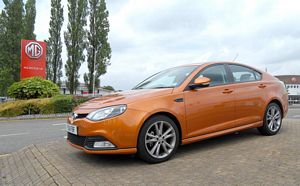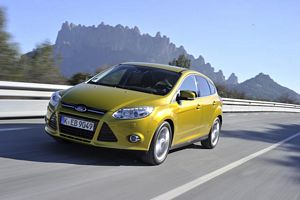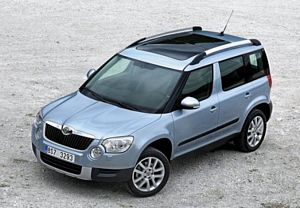|
By accessing/using The Crittenden Automotive Library/CarsAndRacingStuff.com, you signify your agreement with the Terms of Use on our Legal Information page. Our Privacy Policy is also available there. |

How not to lose a fortune when buying a new car
|
|---|
|
|
How not to lose a fortune when buying a new car
Matt Hubbard
Speedmonkey
October 30, 2012
Buying a brand new car carries with it a range of emotions and feelings. Anticipation as your savings (or finance) finally get to the point where you have enough money to afford your new car. Excitement as the brochures are fondled, and the showrooms stalked and the dealers engaged. Nervousness as you look at the range of cars in the market and wonder if you're going to make the right choice - you can only buy one.
There is the frisson of fear mixed with pleasure as you sign away your cash and place an order. You discover the sheer joy of taking delivery of your new pride and joy and drive it away from the dealers for the first time. The smell of 'new car' fills your nostrils as you waft into your drive and, with pride, show your shiny new 2012 model to your family and neighbours.
Buying a new car is a wonderful experience. But if you've made the wrong choice your next feelings will be disappointment and frustration when, after a year or two of ownership, you come to sell it on.
Because any new car drops in value as it leaves the showroom - and some lose a lot more than others. Taking our previous article as a starting point (
Are car prices too high?) we assume you have spent £18,000 on a new car and are selling it in a years time. Whilst this may not be a massively realistic time-frame in todays market it gives the best indicator of how much values drop as soon as a car moves in status from 'new' to 'secondhand'.
We've chosen three cars. We've used Autotrader and The Sunday Times Driving to evaluate prices. There is no better indicator of what's on the market than by actually studying the market. Lots of examples of a particular model will be on sale. To get market price look just above the bottom of the range of those on sale.
MG6 1.8T SE
First up is an MG6 1.8T SE which cost £16,955 when new. The MG is a good looking car which seats four in comfort and has a reasonably refined interior and power train. The engine can be a bit thrashy but overall it is a well sorted car that sits just below a Ford Focus in terms of quality, handling, refinement and cost. The MG6 comes with a three year warranty.
But fast forward twelve months and come to sell your MG6 - and you'll be in for a shock. Prices of year old MG6's with 10,000 miles on the clock are in the order of £10,000. Those are dealer prices and dealers need to make a profit. At a maximum the private seller will have received £8,500 for their year old MG6. You could try and sell privately but don't expect to get more than £9,000.
At best you will have lost £8,000 in one year - and that is if you didn't specify any options which are worth nothing in terms of secondhand value.
Ford Focus Edge 1.6 TDCi 115ps
Now we come to the Focus - a stalwart in the market. Good looking, excellent engines, great interior and legendary handling. The Focus does everything asked of it - although the looks are becoming a little more bland with each iteration. A Focus Edge 1.6TDCi cost £17,795 when new.
Twelve months on and the Edge, with a years warranty left, will be for sale through dealers for £12,500. Ford dealers require a little more upkeep than MG and will take at least £2,000 for themselves. The customer will have been given £10,500 for his year old Focus. £11,000 might be achievable with a private sale.
During your years ownership of a new Ford Focus you will have lost a minimum of £6,800.
Skoda Yeti SE 1.2 TSi
The Yeti was a pretty unique car when it first went on sale. Now it has been emulated by others and high-rise soft roaders are two a penny. It remains one of the best though. A 1.2 TSi costs £17,105 and will seat four in comfort, as well as the dog, luggage and shopping.
In a years time the 1.2 TSi will be for sale on a dealers forecourt for £14,000 with two years warranty remaining - and the customer will have received £12,000. £13,000 may be achievable as a private sale.
The Skoda Yeti will have lost at least £4,105 in a year.
In summary, you will lose money when you buy a brand new car. You will feel disappointed when it comes to selling your still relatively new, but very much secondhand, slice of auto exotica.
But if you choose wisely you will lose less money by buying certain makes and models of cars than others. A well reviewed and regarded car will lose less money. A car that wasn't too overpriced in the first place will lose less money. An MG will lose lots of money. The selling price is determined by nothing more than what people are willing to pay for it.
Higher demand equals higher prices. Skodas lose less value because they are high quality cars that lots of people want and their new price is reasonably low, whereas MG6s, whilst not overpriced per se, are not popular cars. Ford's Focus sells in vast numbers and are high quality cars but they are overpriced - so the secondhand price plummets.
When you buy a new car, choose wisely. Do not be tempted by discounted models for the sake of it. Research the market. And, if at all possible, do yourself a favour and buy a secondhand car. That way someone else will have taken the depreciation hit.





















